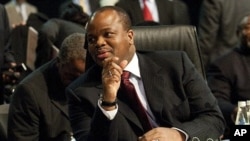Lawyers in Swaziland have resolved to continue a strike despite recently signing a memorandum of understanding with the Judicial Services Commission.
Law Society chairman Titus Mlangeni says their protest will continue until their concerns are fully addressed. Among their demands is a meeting with King Mswati III.
The lawyers embarked on the strike three months ago after the chief justice issued a directive banning them from summoning him to appear in court.
Under the constitution, the king cannot be summoned. But the lawyers argue that since he is the head of all national territory, it is impossible to avoid involving the king in land dispute cases.
Some lawyers have expressed concern the strike is taking a toll on their finances. Mlangeni agrees.
“It is certainly affecting bread and butter issues. The boycott has gone on for longer than we had expected,” said Mlangeni. “But, obviously for a position as serious as a boycott, there must be a reason for it and until we achieve something tangible, it is [unlikely] the boycott can be sustained.”
Observers say the lawyers may not be able to hold out much longer without pay, and the government could gain the upper hand during negotiations. Mlangeni said the administration is nevertheless negotiating in good faith.
“That is probable but I think the experience has been a little different in the past two weeks because the present minister for justice and constitutional affairs has taken a key role in mediating between the Judiciary Services Commission and the Law Society,” said Mlangeni.
Mlangeni praised the efforts of the Minister of Justice and Constitutional Affairs, Chief Mgwagwa Gamedze, for some compromises reached with the lawyers.
“The minister has been quite proactive and the compromise that has been achieved so far has been largely due to his initiative.”
The standoff between the Judiciary Service Commission and the lawyers, observers say, has contributed to the ongoing strike. They also said the strike has crippled the justice system. The absence of lawyers from the courtroom means many Swazis have been prosecuted without access to a court-appointed defense attorney.
“What’s happening is extremely unpleasant because people have been denied the right to legal representation, not because they can’t afford it but, because they cannot access it because of the boycott.” said Mlangeni.
Mlangeni said there are reasons to believe that their concerns would be addressed to ensure the lawyers return to work.
“It is difficult to tell [when we will go back] but my own prognosis will be that we are getting close to getting a settlement of the issues because a memorandum of understanding was signed just about a week ago and we are in the process of tidying it up.”











